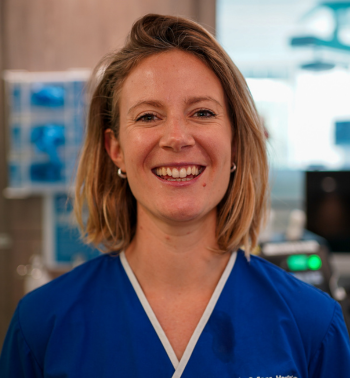28 October 2024
Working between King’s College Hospital NHS FT and King’s College London, ICU nurse Ele discusses her NIHR-funded research on using point of care ultrasound in the intensive care unit.
What is your role within King’s Health Partners?
I am an ICU and research nurse by background currently undertaking a PhD as part of a clinical academic doctoral research fellowship funded by the NIHR under the academic supervision of Prof Louise Rose. The fellowship supports the development of my research alongside protected clinical time to maintain and advance my nursing skills. For my research, I am studying the barriers to implementing point of care ultrasound (PoCUS) in the intensive care unit, so my clinical focus has moved towards advancing my capabilities in ultrasound, as well as supporting PoCUS education amongst other critical care clinicians.
What do you enjoy most about your role?
As my PhD progresses, I am unearthing barriers to successful PoCUS integration that are not just study-specific issues, but issues experienced by clinicians nationwide. Being able to discuss the shared experience of these issues and collectively identify potential solutions with some of the leading specialists in the field is one the most validating elements to my studies as it suggests that the work we’re doing could be relevant to comparable healthcare settings across the country. I also really value the time I get teaching ultrasound skills to fellow ICU colleagues and to see the immediate impact this has on the care of their patients.
What inspired you to get into this work?
I’ve had a keen interest in research since I trained as a nurse at King’s College London. When I became an ICU research nurse at King’s College Hospital NHS Foundation Trust, Dr Phil Hopkins, the critical care research lead, had completed a great deal of preliminary work looking into this PoCUS research project. It was his enthusiasm of the project and his keenness to develop it further that sparked my interest.
Then with the support of Dr Hopkins and the leads for echocardiography and ultrasound, Dr Richard Fisher and Dr Adrian Wong, I was able to study ultrasound to the level I needed to carry out my research. The work I’ve conducted as part of my fellowship so far has really made me appreciate the potential benefits PoCUS could have to ICU patients if training was made more accessible for all ICU staff and routine PoCUS was effectively integrated within the critical care workflow.
What are the benefits of working in partnership?
The opportunity to collaborate across trusts and learn from each other’s experiences is invaluable. The interconnectedness between the university and KHP trusts facilitates the perfect environment for hybrid working by enabling both academic and clinical work to be carried out on the same site.
For example, I can attend academic training or carry out a meeting with my supervisors in the Weston Education Centre on the Denmark Hill site and then continue my work clinically for the remainder of the day. We have incredible King’s College London research facilities within the trust that I can use for conducting study activities with patients or hosting larger meetings, and the integrated nature of training courses across KHP allows easily accessible courses that are highly relevant to both my clinical and academic pathways.
What would be your career top tips?
Reach out to specialists in your field to seek guidance and support.
Keep a diary of everything you’re learning as you go! It’s helpful to revisit and will help you appreciate how far you’ve come.
Utilise the great opportunities KHP has to offer including free training courses, talks and conferences that will help broaden your knowledge, and the ability to connect you with a huge range of highly specialist staff.
__________
Ele has been supported by King’s Clinical Academic Training Office on her research journey, and features in the below video about how it helps guide clinical academic careers:






